![]() Add To Cart This Word Template
Add To Cart This Word Template
 Add To Cart Proposal Pack Safety #4
Add To Cart Proposal Pack Safety #4
 Add To Cart Proposal Kit Professional Bundle
Add To Cart Proposal Kit Professional Bundle


Key Takeaways
- One-time License, No Subscriptions: Pay once and use Proposal Kit forever with an up-front price lower than monthly services over time.
- Best Template Flexibility: Start with a proven Mining Safety Sample Proposal and customize every section, logo, and color to fit your brand and project scope.
- Instant Access: Download immediately and open the sample proposal right away with no waiting, no onboarding delay.
- Ready-Made Structure: See a complete, real-world example (executive summary, scope, schedule, budget, and more) you can mirror for your project. Get a Proposal Pack or Professional package and use the AI Writer to create custom tailored samples or complete first drafts.
- Fully Editable Documents: Replace text, sections, and branding in minutes - no special software skills required.
- Step-by-Step Help: The Proposal Pack Wizard training mode, documentation, and videos guide you through customizing every section so you do not get stuck.
- Built-In Pricing and Quotes: Automate line-item quotes, totals, and taxes from a database, and insert tables/charts so your pricing is clear and consistent.
- Clear Pricing and Bundles: Choose a single industry pack or the Professional bundle for straightforward options that keep costs predictable as your needs grow.
How to write your Mining Safety Proposal
You can create your customized editable variation of this document using Proposal Kit. Follow these steps to get started.
 DOWNLOADABLE, ONE-TIME COST, NO SUBSCRIPTION FEES
DOWNLOADABLE, ONE-TIME COST, NO SUBSCRIPTION FEES
Proposal Pack includes everything you need to get started now
- This sample proposal plus
- Library of all 200 samples
- Library of editable templates
- All templates in this design
- Basic contracts and invoices
- Financial calculators
- Wizard proposal software
- How to Write a Proposal e-books
- Customize with your logo
Screenshots of 4 of 16 pages of this sample
Click the PDF View link above to see more. The complete sample is included in every Proposal Pack and the included Wizard software can build you an editable version in Word that will be in the design theme you purchased. You can purchase a different design theme than the sample is illustrated with.
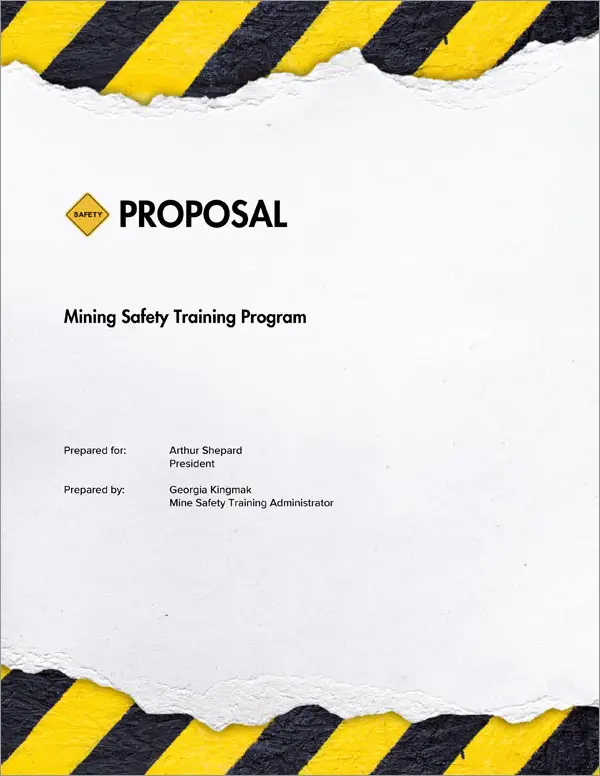
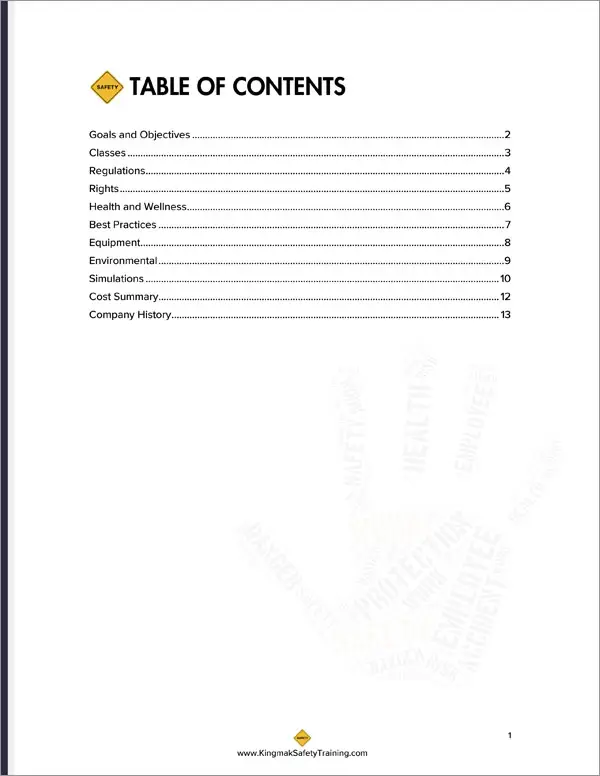
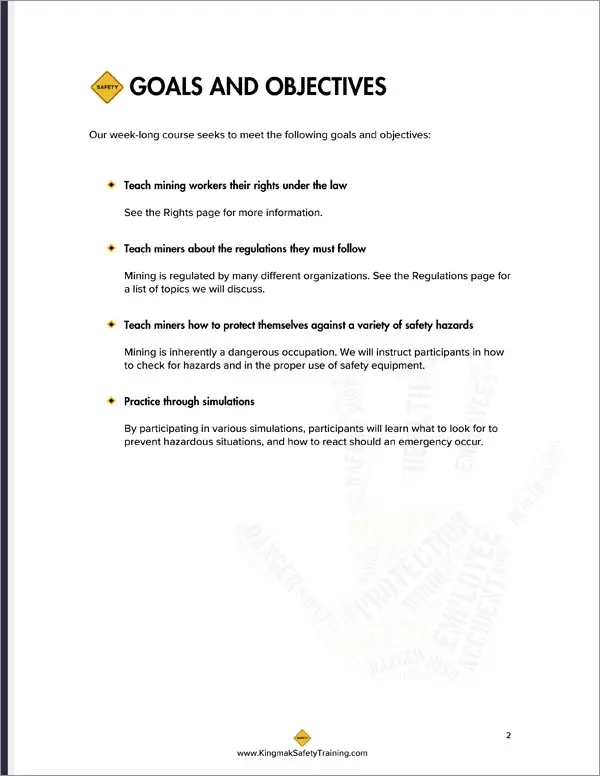
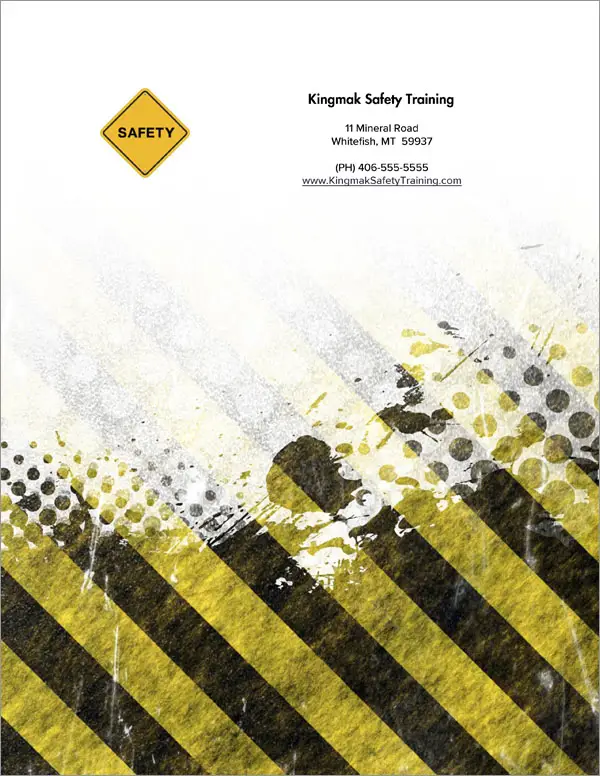
1. Get a Proposal Pack such as Safety #4
This sample was created using the design theme Proposal Pack Safety #4. You can recreate this same sample using any of our Proposal Pack design themes and have it customized for your business.
We include this sample in PDF and editable Word format chapters that can be customized using the included Wizard software when purchased with a Proposal Pack or the Professional Bundle.
To create your customized proposal using your logo and colors, get Proposal Pack for Any Business. We include this sample in every Proposal Pack.
2. Download and install after ordering
Once you have ordered and downloaded your Proposal Pack you will have all the content you need to get started. If you order the sample as a template you will download the Word document after ordering and edit it in your office software.
3. Set up the included Wizard software
While the Wizard software makes the process more efficient, you can manually assemble your version of this sample using the content provided and just a Word processor. We only include the Wizard software with a Proposal Pack or the Professional Bundle.
4. Import the Quick Start layout titled 'Mining Safety Sample Proposal'
The included Proposal Pack Wizard software makes creating a customized version of this document speedy and efficient. The sample content is in Word format documents, so you can also use the sample text without using our Wizard software. Using the Wizard software, you can create custom variations of this template and automate your quotes with the line item database.
This is a good example to follow for anyone looking for mining project or training related services.
Anyone proposing to sell training or safety related services or involved in the mining industry.
5. Customize the template with your information
You can customize the layout with different chapters, change the order of chapters, import your content and information, change the visual design, edit the text, and more. You have complete control over customizing this sample. Use the Wizard's AI Writer to create personalized content specific to your business and project that can be merged with the sample.
Once finished, the AI Writer's Word-to-PowerPoint converter can transform your proposal, business plan, or other business documents into a PowerPoint slideshow.
Abstract
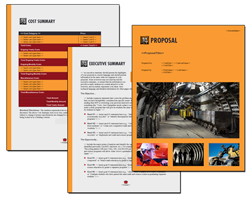
The mining industry faces ongoing challenges in safeguarding the well-being of workers and the environment while maintaining compliance with regulations. Sustainable mining practices are increasingly vital for ensuring long-term industry viability, mitigating environmental impacts, and meeting the expectations of regulatory bodies and stakeholders. A comprehensive approach to mining safety training focuses on education about sustainable practices, the proper use of personal protective equipment, and adherence to best practices that align with legal and ethical standards.
Effective training not only helps miners understand their rights and responsibilities but also prepares them to respond to emergencies and prevent accidents through hands-on simulations and real-world exercises. The development and delivery of such training programs require careful consideration of feasibility, estimated budget, and funding sources to maximize their effectiveness and reach. By prioritizing the health and safety of miners and integrating sustainability into every aspect of operations, mining companies can achieve expected outcomes such as reduced incidents, improved stakeholder confidence, and a stronger reputation for responsible resource development. Tools that streamline proposal creation, such as those offering customizable templates, automated quoting, and AI-driven content generation, support organizations in presenting their commitment to compliance and continuous improvement in mining safety.
Implementing sustainable mining practices is important not only for environmental protection but also for maintaining the trust and satisfaction of stakeholders invested in the mining sector. Mining operations that embrace sustainable practices help ensure the longevity of natural resources and support the well-being of both employees and nearby communities. The integration of personal protective equipment and ongoing education through structured training programs plays an important role in minimizing risks and advancing development within the industry.
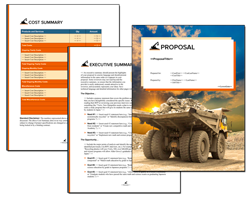
Accurate and clear documentation, created through solutions like Proposal Kit, allows organizations to clearly outline expected outcomes, estimated budgets, and funding justifications, which is critical when seeking the support of regulatory bodies or external partners. By demonstrating a strong commitment to compliance and the effectiveness of safety measures, mining companies position themselves as leaders in responsible resource management. This proactive approach enhances feasibility for future projects and ensures that regulatory requirements are met, ultimately contributing to a safer, more sustainable mining industry for all involved.
A heightened focus on sustainable mining practices also reflects the growing demand from both local and global communities for responsible resource extraction. The mining industry is under increasing pressure to balance economic growth with environmental stewardship, urging companies to adopt methods that minimize ecological damage while maximizing operational safety. Comprehensive safety proposals that highlight compliance with the latest regulatory standards demonstrate transparency and accountability, which are highly valued by investors and community members alike.
Moreover, the inclusion of stakeholders in the planning and development phases fosters collaboration and ensures that diverse perspectives are considered, enhancing the overall effectiveness of mining initiatives. Education remains a cornerstone of successful safety programs, empowering workers to actively participate in risk identification, hazard prevention, and proper use of personal protective equipment. Robust funding strategies and an accurate estimated budget are necessary for implementing these measures, supporting the feasibility of ongoing improvements and long-term sustainability.
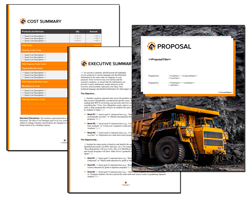
By using advanced document creation tools, mining organizations can efficiently prepare proposals that articulate their strategies, address the concerns of regulatory bodies, and outline their commitments to sustainable practices. These clear, well-structured documents help secure the necessary funding and approvals, creating a pathway for safer operations and improved well-being for workers and communities. Ultimately, such comprehensive approaches position companies to achieve their expected outcomes and maintain a leadership role in advancing sustainable mining practices.
Mining Safety Sample Proposal - The Narrative
Mining Safety Training Program
Congratulations on the formation of your new mining company. As you know, mining can be a dangerous occupation. Each year many mining companies are fined for safety violations and - in the worst cases - have serious and even fatal accidents on their mining sites. To ensure the safety of all your personnel and the success of your mining enterprise, training is absolutely crucial.
We are one of the most experienced mine safety training companies in the west. With more than twelve years of teaching under our belts, we have a proven track record of training miners how to create a successful, safe mining business. After your employees and managers have passed our intensive week long course and put all their knowledge to daily use, you can feel confident about passing all tests with flying colors when the MSA inspector comes calling at your site. I look forward to discussing your needs with you next week.
To ensure the safety of all your personnel and the success of your mining enterprise, training is absolutely crucial. After your employees and managers have passed our intensive week long course, you can feel confident about passing all tests with flying colors when your site is inspected. Our week long course seeks to meet the following goals and objectives.
Goals and Objectives
Teach mining workers their rights under the law See the Rights page for more information. Teach miners about the regulations they must follow Mining is regulated by many different organizations. See the Regulations page for a list of topics we will discuss.
Teach miners how to protect themselves against a variety of safety hazards Mining is inherently a dangerous occupation. We will instruct participants in how to check for hazards and in the proper use of safety equipment. Practice through simulations By participating in various simulations, participants will learn what to look for to prevent hazardous situations, and how to react should an emergency occur.
Our Mining Safety course is a five day, forty hour course. Classes typically meet from 8.00 am to 5.00 pm with a one hour break for lunch from noon to 1 pm. Our week of classes will consist of the following.
MONDAY
Introduction to Mining Work and Your Rights This class will be an overview of the types of jobs and issues found in the mining industry as well as the rights and responsibilities of miners and mining companies. See the Regulations and Rights pages in this proposal for more information.
TUESDAY
General Health, Wellness and Safety In this class we will discuss the common health and safety issues encountered by miners and how to protect against illness and injury. See the Health and Wellness and the Best Practices pages for more information.
WEDNESDAY
Equipment Safety Many mining accidents are due to equipment failure or improper use of equipment. In this class, we will learn how to inspect all types of equipment to prevent problems, and how to safely use different types of equipment. See the Equipment page for more information.
THURSDAY
Environmental Issues Miners must be aware of a variety of environmental issues, not only to ensure their own safety, but to ensure that the mining site will be a safe environment for the workers and the surrounding community. See the Environmental page for more information about topics we will cover.
FRIDAY
Simulations & Testing On our final day of class, all participants will interact in various simulations of possible emergency situations. We will also conduct written and oral testing to be sure that all participants fully understand what has been taught during the week. See the Simulations page for possible simulated situations. All participants will be given a class notebook that is theirs to keep, as well as a certificate of course completion.
The notebook contains nearly 500 pages of valuable reference information. Mining activity is regulated by The Mine Improvement and New Emergency Response Act of 2006, also known as the MINER Act, which amended the Mine Safety and Health Act of 1977. The MINER Act spells out the regulations and responsibilities of miners and mining companies. The agency in charge of enforcement is the Mine Safety and Health Administration MSHA.
Mining operations are also subject to other regulations, such as those imposed by FDA, EPA, and OSHA, as well as to regulations from local authorities. We will learn what all these regulations mean for miners. We will discuss the following requirements that are of interest to miners.
- Required Accident Preparedness and Emergency Response Plans
- Requirements for Rescue Teams
- Communications Requirements
- Incident Reporting Requirements
- Equipment and Technology Requirements
- Scholarship and Grant Programs for Miners
We will also discuss the roles and responsibilities of the many different governmental offices that oversee mining operations. See also the Rights page for a list of the rights of miners established by the MSHA that will be discussed in class. All mining workers are entitled to certain rights under the Mining Act of 1977. Partipants will learn their rights and responsibilities in class, as well as how to report incidents or complaints to the proper authorities.
The following rights will be discussed. The right to testify, assist, or participate in any proceeding instituted under the Mining Act of 1977. The right to file a complaint with the Federal Mine Safety and Health Review Commission. The right to refuse to work in unsafe or unhealthy conditions.
The right to refuse to work at the mine if you do not have the required health and safety training. The right to have a medical evaluation after exposure to hazardous substances and the right to be considered for transfer to a different job if the medical evaluation indicates problems. Miners and mining companies have responsibilities as well as rights. See the Regulations page to learn more.
Miners are subject to a variety of potential health hazards. The following will be discussed in class. How to Protect Against Back Injuries and Other Muscle Injuries Many mining jobs are physically stressful, particularly on the back.
We'll discuss the general fitness required of miners, as well as how to protect against various common injuries, with special emphasis on repetitive motion injuries. How to Protect Your Lungs Miners are frequently subjected to dusty conditions, and sometimes to conditions in which hazardous gasses may be present or other breathing hazards such as silica or asbestos. They may also work in areas in which diseases such as hantavirus are risks.
We will learn about different types of masks and respirators, the conditions in which each is warranted, and their proper use. How to Avoid Heat Stress Many mines are hot environments, and miners need to protect themselves against heat exhaustion and heat stroke. We will cover how to protect against these problems as well as how to recognize and treat these conditions. How to Deal with Noise Issues Whether they are working in surface mines or underground tunnels, miners are subject to hearing damage from excessive noise levels.
We'll learn how to protect against hearing damage. Assorted Environmental Health Issues Miners must constantly look for potential safety hazards in their environment. These might be structural, like ensuring that walls and ceilings are sufficiently shored up, invisible problems like the presence of radon or asbestos, water leakage that could indicate possible flood potential or electrical hazards, combinations of hazardous chemicals, potential for fires, and so forth.
See the Environmental pages for more information. Our classes will focus on teaching the following best practices of mining. Inspect the work environment for safety hazards before beginning your shift.
Inspect equipment and correct problems before beginning operation. Wear fall protection when there is any risk of falling. Sound an audible warning before starting equipment.
Wear seat belts and other required safety gear while operating equipment. Set brakes, safely position wheels, and power down before leaving equipment. Before approaching any piece of equipment, make visual contact with the operator and receive acknowledgment from the operator.
Never pass under, work under, or allow others to work under suspended loads. Barricade off hazardous areas. Use all metering devices as instructed. Use all safety gear as instructed.
Promptly report any safety concerns, violations, or incidents to a supervisor. A big part of mining safety is learning how to safely operate and work around heavy equipment. Many injuries occur each year due to equipment failures or due to faulty use of equipment. Although we cannot teach participants how to use all types of equipment, we will discuss how to perform routine safety checks on equipment, how to find out the safety equipment and training required for operators, and discuss how to safely work around heavy equipment.
Our instruction will include the following types of equipment.
- Front end loaders and dump trucks
- Tunnel boring and drilling machines
- Backhoes and trackhoes
- Cranes
- Conveyor belts
- Scissor lifts and forklifts
- Jackhammers and various drills
- Jacks and other support equipment
- Measuring devices, such as oxygen meters, pressure gauges, radiation monitors, etc.
- Fire suppression equipment
- Ventilation equipment
- Elevators of various types
- Scaffolding
- Ladders
- Pulley systems
- Fall protection gear
Instructors may add to or subtract from the list above as needed to address the needs of a particular mining site or company. Mining activities can have major impacts on the surrounding areas and communities. We teach our participants to recognize and prevent problems that may affect not only the health of workers at the mine site, but those that could affect the local ecosystem well into the future. Some environmental protection activities are mandated by law; others are simply part of being a good neighbor and heading off potential legal challenges against the mining company.
Some of the issues we will discuss in class are. Release of noxious gasses and fumes into the air. Dumping of mine tailings that create slide hazards and or may wash into local water systems.
Noise issues created by operations of heavy machinery and use of explosives. Use of toxic chemicals to extract minerals. Transportation issues.
Leakage of toxic chemicals into aquifers and other groundwater systems. Requirements for sealing inactive areas to protect the public. Restoration of mined areas. Classroom learning can only go so far.
Students need to practice what they have learned through hands on drills, so the last day of class focuses on the following simulations.
Equipment Inspection
One of the safety aspects we stress is to do an inspection of equipment to be used prior to operating it. Participants will learn to look for potential hazards such as worn or cracked pressure hoses and clamps, leaky valves, loose fittings, frayed electrical wires, cracked conduits, and lack of proper grounding for electrical connections, and so forth. We want participants to recognize potential hazards before they develop into emergency situations, and to recognize what types of safety equipment are required for operation of different pieces of equipment. In order to give participants practice, we will either transport participants to an appropriate location or bring a few pieces of equipment to the classroom site.
Students will learn to inspect not only heavy machinery but smaller items such as testing and measuring equipment, water hoses and nozzles, fire suppression equipment, and so forth. Instructors will ensure that some equipment problems are present, and students will use a checklist to inspect equipment. Students must also indicate the safety equipment required for use with various pieces of equipment. Instructors will correct and add to the discussions as needed.
Environment Inspection
It's important for miners to be aware of environmental hazards at all times. Partipants will learn to look for potential hazards as unstable earth or rock, harmful substances & gasses, dangers from proximity to equipment, and so forth. They will also identify hazards to the natural environment such as leaking fumes or other harmful substances that wild animals or the public might come into contact with.
We want participants to recognize potential hazards before these situations cause injuries or health issues, and to recognize their responsibilities in protecting the surrounding environment. If possible, students will inspect one or more active or proposed mine sites. If not feasible, slides of such sites will be used in the classroom to discuss what to look for.
Instructors will ensure that some environmental problems are present, and students will use a checklist to inspect equipment. Students must also indicate the safety equipment required for use with various pieces of equipment. Instructors will correct and add to the discussions as needed.
Emergency Situations
Students will identify and deal with the following situations. Fire, Heat Stroke, Noxious Gas Release, Sudden Blow Injury to Head, Heart Attack. It's important for miners to learn how to assess and handle various emergency situations, as most mines are far from outside help.
We want participants to react calmly, recognize what needs to be done, and be able to request the necessary services. Instructors or their helpers will set up the scenarios and act as "victims." Students must assess each situation, react appropriately, and state what should be done next. Instructors will correct and add to the discussions as needed.
The cost for our standard mine safety training course as described on the Classes page is $1500 per person. We require a minimum of five students per course. This course cost includes.
Four days of teaching by an expert instructor at your facility. A reference manual of nearly 500 pages, with lists of all relevant regulations and links to useful websites. One day of simulations and practice with the instructor and helpers. If you do not have an appropriate classroom available, facilities may be rented nearby for an additional cost.
Note that on simulations day, we want to practice with real equipment if at all possible. If equipment is not available at your work site, additional rental fees may apply, or we may transport students to an appropriate site for an additional transportation fee. Additional courses or special topics may be added as needed, for additional fees.
For an addition charge of $150, simulations may be filmed and stored on a master DVD. This can provide useful information for managers and workers alike. Standard Disclaimer. The numbers represented above are to be used as an estimate for the courses described in this proposal.
The above Cost Summary does in no way constitute a warranty of final price. Final price will be set by agreement of KingMak Safety Training and client as to course contents, location, and availability of equipment. Final price will be locked in by a binding contract. About us – Kingmak Safety Training is one of the most experienced safety training companies in the western United States.
We specialize in safety training for construction sites, manufacturing environments, and both surface and underground mining operations. Safety and equipment know how runs in the Kingmak family. We also own and operate Kingmak TrucKingmak Services and Kingmak Equipment Rentals, and we manage three mining operations in Idaho, Montana, and Colorado.
The safety records of all our operations rank among the best in the nation, and are public records, available for your inspection. We can develop a custom training course for you. Kingmak Safety Training was founded in 2001 and employs approximately 72 people. Kingmak Safety Training is headquartered in Whitefish, Montana.
Our instructors routinely travel and teach throughout the United States and Canada, and have even taught courses in Europe and South America. Products – Safety training manuals and DVDs for all kinds of equipment and construction, manufacturing, or mining environments. Services Safety training courses for all kinds of equipment and construction, manufacturing, or mining environments.
How to Contact Kingmak Safety Training You can always reach us using the following information.
 What Our Clients Say
What Our Clients SayI have purchased this in the past (twice) for people I have worked for and I’m going to submit a proposal myself since I know how to do the work but Proposal Pack cuts a lot of the labor involved in "explaining" the process."
There are 200 complete sample proposals including this one in each Proposal Pack
The following related samples are also included in Proposal Pack:
These template layouts are related to this sample
The following related templates are also included in Proposal Pack with this sample:
- OSHA Health and Safety Compliance Plan Proposal
- Site Safety Upgrades to Meet Regulations Proposal
- Mining Assessment Report
- Safety Plan
- Rescue Plan
- Safety Training and Consulting Services Proposal
- Mining Natural Resources Development Proposal
- Expression of Interest for Mining Proposal
- Safety Strategy and Training Program Proposal
- Mining Investment Funding Proposal
- Mining Production Proposal
Length of Sample
16 PagesThere are thousands of chapters to choose from in Proposal Pack. This sample uses the following set of Proposal Pack chapter templates: Cover Letter, Title Page, Table of Contents, Cost Summary, Goals and Objectives, Simulations, Classes, Regulations, Equipment, Environmental, Health and Wellness, Company History, Rights, Best Practices, Back Page.
Mining Safety Sample Proposal Calculator Spreadheets
These Excel calculator spreadsheets are included with this template. If you purchase a Proposal Pack or the Professional Bundle, these proposal pages are generated using an automated line-item database in the included Wizard software. The calculator spreadsheets are intended for use when purchasing only the sample as a static Word template.
This sample illustrates how to write the following types of proposals
- General business proposal
- Education, training proposal
- Non-technical proposal
- Service sales proposal
- Security, safety, protection, investigation proposal
- Many other types of proposals
Samples can be created in any Proposal Pack design theme
This sample was created with Proposal Pack Safety #4. To change the visual look purchase any Proposal Pack and this sample will be created in that design theme.
Out of the over 501 Proposal Packs available these designs are also popular for this type of proposal and this sample proposal is also included in every Proposal Pack:
Photo Design Proposal Packs
 Proposal Pack Mining #2
Proposal Pack Mining #2 Proposal Pack Mining #3
Proposal Pack Mining #3 Proposal Pack Mining #4
Proposal Pack Mining #4 Proposal Pack Safety #5
Proposal Pack Safety #5Line Art Design Proposal Packs
 Proposal Pack Mining #1
Proposal Pack Mining #1 Proposal Pack Outdoors #1
Proposal Pack Outdoors #1 Proposal Pack Safety #3
Proposal Pack Safety #320% Off Discount
![]() Add To Cart This Word Template
Add To Cart This Word Template
 Add To Cart Proposal Pack Safety #4
Add To Cart Proposal Pack Safety #4
 Add To Cart Proposal Kit Professional Bundle
Add To Cart Proposal Kit Professional Bundle
 4.7 stars, based on 849 reviews
4.7 stars, based on 849 reviewsHow to Write a Mining Industry Proposal
This video shows how companies write various mining industry proposals, business plans, reports and studies using Proposal Kit. You can create a wide variety of proposals including RFP responses, investment pitches, project proposals, service and product sales, startup business plans, environmental studies, safety plans and so on. Proposal Kit also has a variety of customizable mining graphic design themes or you can make your own based on your company logo.
Frequently Asked Questions
How do I customize this sample to fit my specific project or business?
If you purchase this sample as a static template, it will be an editable Word format document; otherwise, if you buy a Proposal Pack or the Professional bundle, you can build a more customized editable Word document version of it using the included Wizard software. You can replace the sample information with your own, adjust the text to match your company's tone and style, and modify sections to include project-specific details. The included AI Writer will also customize the content for you.
Can I use multiple sample proposals for different types of projects?
You can purchase multiple samples as individual Word templates or all 200 samples are included in every Proposal Pack and Proposal Kit Professional, which is a much better deal. The Proposal Kit offers sample proposals for various industries and project types. You can select and customize different sample proposals to suit each unique project. This flexibility allows you to create tailored proposals for other clients or projects.
How can I integrate my branding into this sample?
While this sample is an editable Word document, depending on the level of custom branding needed, consider the Proposal Kit Professional, which includes the branding features in the Wizard software that let you create custom-branded design themes more effectively. Start by incorporating your company's logo on the cover page, as well as in the headers and footers of the document. Next, adjust the color scheme of the proposal to match your brand colors. Change the fonts in the proposal to align with your brand's standard fonts. Including branded graphics that reflect your brand's style will further enhance the proposal. Additionally, ensure that the text within the proposal maintains a tone and voice consistent with your brand's communication style. By integrating these elements, your proposal will reinforce your brand identity.
How do I ensure my proposal stands out and wins the client?
To ensure your proposal stands out:
- Personalize the content: Address the client's needs, challenges, and goals to make the proposal unique.
- Highlight your value proposition: Communicate what sets your business apart and how to deliver superior results.
- Use professional design elements: Incorporate visuals, charts, and graphs to enhance the presentation and make it more engaging.
- Proofread and edit: Ensure the proposal is error-free and well-organized. A polished, professional document reflects your attention to detail and professionalism.
What should I do if I need help understanding or modifying a section of this sample?
If you need help understanding or modifying a section of this sample, refer to the detailed instructions provided. Additionally, Proposal Kit includes customer support and resources such as tutorials and videos to assist you. Consulting with a colleague or a professional in your industry can also be beneficial if further clarification is needed. Asking an AI tool can also provide valuable insights for immediate needs. You can load this sample into the Wizard software and let its AI Writer customize the pages for you.
 Ian Lauder has been helping businesses write their proposals and contracts for two decades. Ian is the owner and founder of Proposal Kit, one of the original sources of business proposal and contract software products started in 1997.
Ian Lauder has been helping businesses write their proposals and contracts for two decades. Ian is the owner and founder of Proposal Kit, one of the original sources of business proposal and contract software products started in 1997.By Ian Lauder
 Published by Proposal Kit, Inc.
Published by Proposal Kit, Inc.


 Cart
Cart


 Facebook
Facebook YouTube
YouTube Bluesky
Bluesky Search Site
Search Site